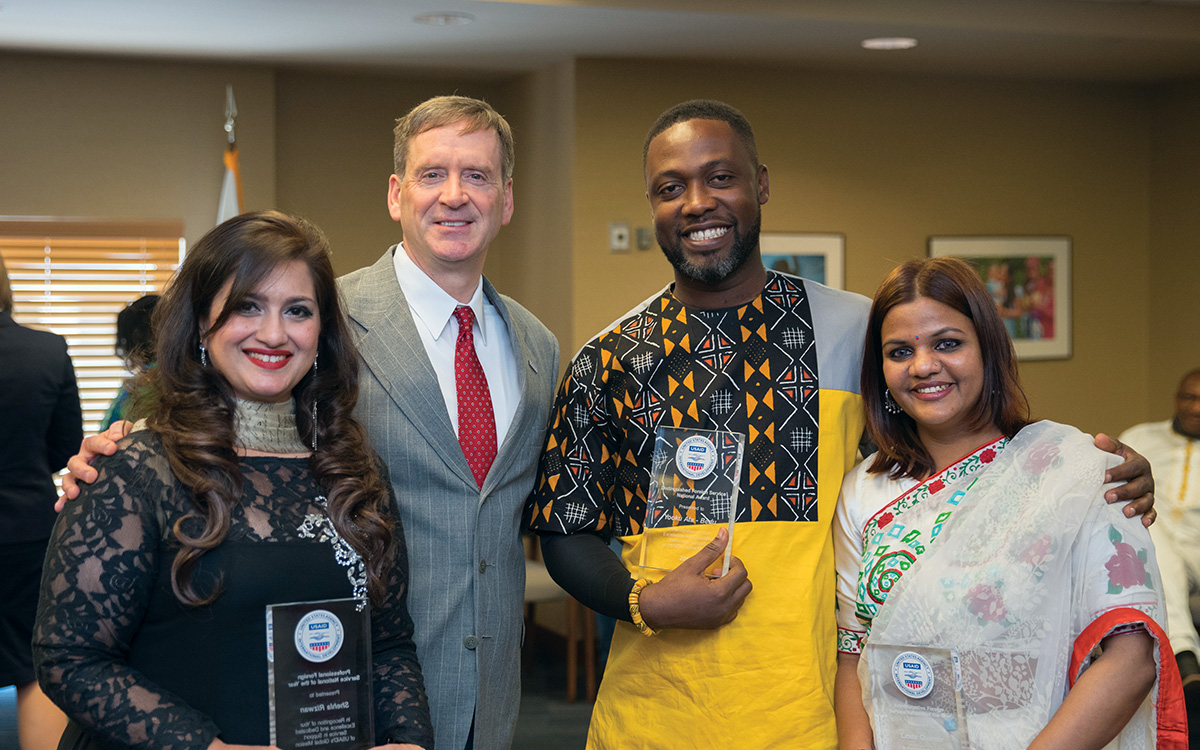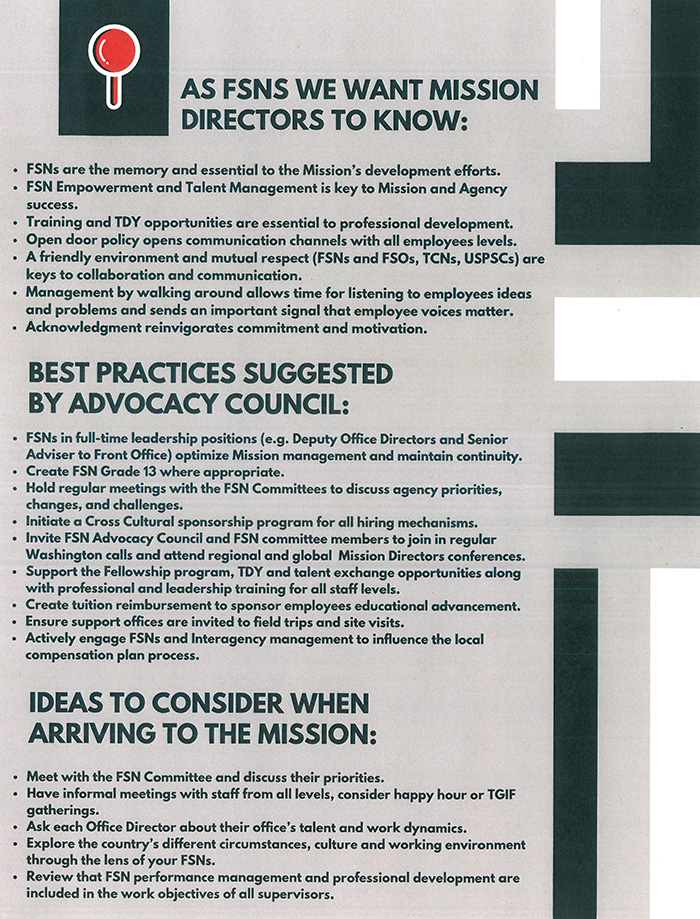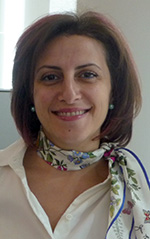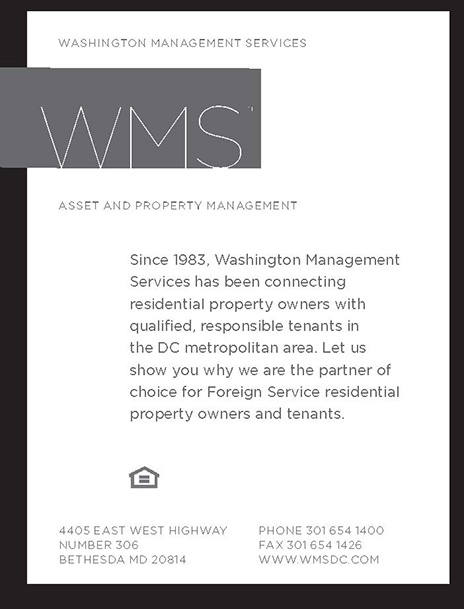Advocating for Foreign Service Nationals
The FSN Advocacy Council has been representing USAID’s global FSN employees since 2005.
BY SAFIA AL-SAAD

Pictured from left to right are Shehla Rizwan, the 2017 Professional FSN of the Year; USAID Administrator Mark Green; Yooku Ata-Bedu, one of six 2017 Distinguished FSN Award recipients; and Linda Quamar, the 2017 Administrative FSN of the Year.
I can still remember writing my campaign paragraph asking FSNs around the world to elect me to USAID’s FSN Advocacy Council. I was excited and saw how my experience as a human resources specialist with USAID/ Jordan, interacting with colleagues on all matters, could benefit the council. My work experience prepared me for articulating FSNs’ wants and desires with respect to enhancing their future career paths and livelihoods. I felt honored to be elected co-chair by my colleagues and to have the opportunity to apply my experience and vision toward realizing the FSN Advocacy Council’s goals.
The newly elected 2017-2018 FSN Advocacy Council gathered in Washington, D.C., in February 2017. We came from many different countries and cultures, but we were all focused on one goal that week—upholding the mission of the FSN Advocacy Council to increase transparency and communication between USAID/ Washington and overseas missions. We wanted to build on the previous council’s achievements and amplify the voice of the global FSN community.
The council is tasked with representing FSN views, ideas and concerns and promoting better understanding of, and engagement in, USAID operations and programmatic policy.
The dozen of us who traveled to participate in the teambuilding and planning meeting represented the 4,900 FSNs who comprise half of USAID’s global workforce. FSNs serve in a wide variety of positions, from senior technical experts advising host governments to budget analysts securing funding and procurement agents negotiating the best value for money. We provide critical technical expertise, host-country knowledge and administrative support to our missions around the world. Our local knowledge and cultural awareness add to the agency’s overall credibility when partnering with host-country counterparts.
The council is tasked with representing FSN views, ideas and concerns and promoting better understanding of, and engagement in, USAID operations and programmatic policy. It also addresses their concerns, advocates for FSN interests, builds trust and encourages active contribution to initiatives and programs affecting USAID equities. The council connects the field with information flowing in both directions, making sure FSN voices are heard.
Charting a New Course

A new initiative of the USAID FSN Advocacy Council, this flyer was designed for mission directors and staff at every level heading to post. It was shared with participants at the annual USAID Mission Directors Conference held in the Washington, D.C., area in November. (click image to read)
Dusty human resources files document a first worldwide FSN conference in September 2002, which was only for Department of State staff. A year later, a second conference included USAID. In 2004 USAID Administrator Andrew Natsios held an agencywide FSN conference and declared 2005 the “Year of the FSN.” This gave birth to the first iteration of a USAID FSN Advisory Council, and several regional conferences were held. From then on, there was an active USAID FSN Advisory Council with Washington and field-based participants, but no face-to-face gatherings until 2012.
All the while, FSNs continued to contribute local expertise to add to the agency’s overall credibility when partnering with host countries. FSNs with technical, financial, procurement, management and human resources skills have helped set up missions in Iraq, Afghanistan, South Sudan and other countries, and have helped to train and mentor new FSOs, as well. Mohammed Yassein, a former FSN from USAID/Jordan who participated in one of the 2005 regional conferences, believes USAID’s response to the Arab Spring illustrates the value and expertise of FSNs who continue to work under dire circumstances, even after Americans are evacuated.
When Rajiv Shah was appointed USAID Administrator in 2010, he immediately asked about the composition of the agency’s workforce. He said he was struck by how much of its mission was carried out by FSNs. In 2012 a global FSN conference involved brainstorming sessions on framing the relationship between management and the FSN workforce. One output was a global conference in November 2013, with every USAID mission represented, to explore the issues, concerns and creative ideas of the FSN workforce. As Abdul Sumara of USAID/Angola said, that was a groundbreaking “conference for FSNs by FSNs.”
I didn’t attend the 2013 conference, but I understand it was a powerful gathering. The FSNs there asked for full recognition of their skills and competencies; they stressed the importance of having leadership roles in their missions and of having their leadership skills developed. FSNs also pinpointed the importance of the orientation between both American and FSN hires in the working environment and called for reconsideration of the Local Compensation Plans that differed from one mission to another depending on the local laws and economic situation. In other words, we used our voices to let leadership know what mattered to us.
Participants in the 2013 conference completely reworked the existing council structure, writing a new charter and branding the council as an “advocacy” rather than an “advisory” body. A structure of regional representatives voted for directly by FSNs was created, and two-year terms were established. The new council was launched in February 2014 following global elections. The council’s journey advocating for the worldwide FSN community had begun.
What Advocacy Looks Like
Work initiated at the 2013 conference was carried over to the next council, which works in a unique collaborative way to apply advocated actions globally. Soon after we returned from Washington, we developed an assessment survey of the FSN local committees’ status in each mission. After collecting the data, we implemented several initiatives. In one, the council advocated for USAID’s Staff Care program, which resulted in expanding the program and providing 24/7 access to counselors for all USAID staff and their family members, regardless of hiring category.
At the time, there was an ongoing wage freeze, and salaries were a large concern. Agency leadership recognized the issue and was open and transparent about the interagency process. They shared that they were not sure when the freeze would be lifted, but encouraged the FSN committees to work with their embassies to request waivers from Washington should the inflation rate become significant. The FSN Advocacy Council continued to work on local compensation plan issues after the three-year wage freeze was lifted in 2014. USAID leadership’s respect and willingness to work for a flexible solution was appreciated and continues to this day.
The FSN Advocacy Council continued to work on local compensation plan issues after the three-year wage freeze was lifted in 2014.
We also select best practices from different missions to be adopted globally. USAID/Senegal had a great experience creating cultural sponsors for new employees to promote understanding and a greater sense of team spirit. This best practice was shared with all missions, encouraging them to implement similar programs. The council followed up with mission FSN committees to hear if and how they are adapting a cultural sponsorship program at their missions.
These gains are the direct result of our collective commitment to reaching out and checking in with the FSN community. We know the importance of making the connections and building these relationships, of having our ears to the ground. The networks that we form help us share best practices across missions.
A Voice for the FSN Workforce, Now and in the Future
Every two years, the FSN Advocacy Council renews its membership to bring in fresh voices and new perspectives. Council members represent the regions in which USAID operates, with one or two representatives from each region, depending on its size. Elected co-chairs serve for one year. The council includes senior leadership in USAID/Washington who connect quarterly and are assigned tasks to advance each quarter.
What started as a conversation nearly 20 years ago has grown into a full-fledged initiative, making changes where they matter. For me, it has been a very fruitful experience to be one of the regional representatives and, at the same time, one of the cochairs. I have the full support of my mission leadership in Jordan. That helps me focus on collaborating with the local committee in Jordan while also seeing the big picture regionally and globally.
Because of mission director and bureau support, the USAID Bureau for the Middle East held a meeting of all mission FSN Committee points of contact for us to meet each other, discuss our issues and share ideas. This gathering was a model for all regions to follow and is now a part of the FSN Advocacy Council’s plans for future years. Mission directors have also supported the establishment of a website that lists the skills of FSNs available for short-term assignments or as a general resource on a topic. We worked together across missions to establish this website, which will be finalized soon. It’s an amazing feeling of accomplishment, excitement and responsibility.
In five short years, and with the support of the agency’s senior leadership, we’ve built a sustainable advocacy initiative and have a stronger FSN community because of it. This will help USAID achieve its mission.
USAID FSN Advocacy Council
The purpose of the FSN Advocacy Council is to work as one team, to champion and advance USAID and to model our core values for mission excellence, integrity, respect, empowerment, inclusion and commitment to learning. We intend to demonstrate these core values by promoting greater participation of FSNs through more active involvement in strategic direction and operations.
The three main goals of the FSN Advocacy Council are:
- Represent the prevailing views, ideas and concerns of FSNs to USAID leadership in both Washington and overseas;
- Gain the confidence of FSNs worldwide, and;
- Increase transparency and communication between USAID/Washington and the missions, and support a worldwide USAID community of practice.
The council agenda focuses on four main areas, each with its own action plan:
1. Local Compensation Plans
- Empower FSN committees to provide credible information on the Local Compensation Plan process to FSNs.
- Advocate for greater transparency and FSN engagement in the annual Local Compensation Questionnaires.
2. FSN Talent Management and Empowerment
- Advocate for expanded utilization of Senior FSN skills.
- Improve FSNs’ professional development.
3. Communications
- Increase FSN awareness of the communications channels available to them, including the role of FSN committees and the FSN Advocacy Council.
- Increase the sharing of best practices by FSNs globally.
- Establish regional networks to strengthen the sense of connection among FSNs.
- Provide FSN constituents opportunities to offer feedback.
- Increase FSN visibility in USAID/Washington.
4. Cross Cultural and Inclusiveness
- Gather and centralize best practices across the agency.
- Create long-term mechanisms to maintain and strengthen cross-cultural relations.
- Establish a program to integrate new employees from all hiring categories into the workforce at post.
USAID’s FSN Advocacy Council has many notable accomplishments, such as the following:
- Each mission has an active FSN Committee, with regular elections of leadership and close ties to its regional FSN Advocacy Council representatives. This revitalization has brought new life to dormant associations.
- FSNs now participate in the hiring process for selection of new Foreign Service officers, ensuring that our future leaders see the agency’s commitment to diversity and inclusion from day one.
- Regional FSN gatherings have been held—many for the first time—allowing constituents to meet their representatives, share ideas and set action plans.
- FSNs are now part of regional and global mission directors’ conferences, and are regularly invited to join regional mission director conference calls.
- Regional TDY Exchange Programs and Talent Banks have been established in West Africa, the Middle East and Europe and Eurasia, to facilitate career development and give the agency access to short-term expertise in a timely fashion.
- The council has helped increase Federal Employee Viewpoint Survey participation from 30 percent in 2015 to about 50 percent in 2017, ensuring more voices are captured in this important workforce survey that directly feeds into agency action steps.
- The council successfully advocated for removal of the waiting period for FSNs to move from a lower grade to a higher grade if qualified and selected for the position, consistent with the rules governing personal service contracts.
- For 10 years the FSN Fellowship Program has brought talented FSNs to Washington to expand their perspective on the agency and professional development, while providing offices with additional technical expertise and the perspective from the field.
—Elizabeth Santucci, FSN Unit, USAID Human Capital and Talent Managment





